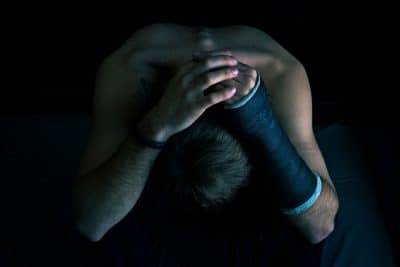 After you have been through a severe accident, you may be healed from your physical injuries but are still dealing with emotional or psychological pain. You may be struggling with upsetting emotions. You may be battling with recurring images, haunting memories, or overwhelming anxiety. Or maybe you feel heavy, brooding feelings, or you don’t think you’re even feeling at all. You may feel numb, disconnected, or apathetic. Traumatic experiences can make you forget what life was like before the accident happened. It can take days, months, years and even a lifetime to sort through trauma and to get over the pain. Understanding what you are going through and receiving the right help and support are keys to your recovery.
After you have been through a severe accident, you may be healed from your physical injuries but are still dealing with emotional or psychological pain. You may be struggling with upsetting emotions. You may be battling with recurring images, haunting memories, or overwhelming anxiety. Or maybe you feel heavy, brooding feelings, or you don’t think you’re even feeling at all. You may feel numb, disconnected, or apathetic. Traumatic experiences can make you forget what life was like before the accident happened. It can take days, months, years and even a lifetime to sort through trauma and to get over the pain. Understanding what you are going through and receiving the right help and support are keys to your recovery.
Table of Contents
What Is Emotional or Psychological Trauma?
Emotional or Psychological trauma is a type of damage caused to the emotions or psyche due to a traumatic event—a sudden threat to one’s life or psychological wellbeing. Traumatic events can be a single occurrence or a series of occurrences that completely overwhelm an individual’s ability to cope and shatter that person’s sense of security and familiarity with the world around them. Emotional trauma does not have to be accompanied by a physical injury, but can also come from witnessing an event. The point is, a person’s personal subjective emotional experience, rather than the objective “reality,” determines whether a situation is traumatic or not. Regardless of the details of the event, the traumatic change that one undergoes happens unexpectedly when the person is unprepared. It is not possible to predict how a person will react to an event, especially when there was nothing that the person could have done to prevent the event from happening.
Changes in the Brain
Studies show that trauma physically affects the following key structures in the brain:
- Hippocampus (part of the limbic system which helps us with short and long term memory and spatial navigation)
- Amygdala (which also affects our memory but also enables us to make decisions and process emotions)
- Cortex, (which plays a role in complex cognitive behaviors, personality expression, and moderation of correct social behavior).
Trauma can be experienced both in short-term and long-term cases. In more short-term cases, the brain goes into a sudden state of panic or fear which includes a rush of adrenaline, cortisol, and other hormones. During that time the brain sends a signal to the body to either fight or flee the danger it senses, and the person has difficulty processing information. Short-term trauma is more common than long-term trauma. The length of time one experiences this state differs from person to person. One person who experiences an event may be affected while another who experiences the same event may not. Factors such as the nature of the traumatic event, the availability of support, previous and current life stress, personality, and coping resources affect the length of time one suffers from emotional or psychological trauma.
Symptoms
For someone who is used to being in full control of their thoughts and emotions, it can be surprising and embarrassing to experience emotional or psychological trauma. The following is a table of symptoms provided by the Australian Psychological Society (APS) that breaks the symptoms down into four categories: physical, cognitive, behavioral, and emotional:
| Physical |
|
|---|---|
| Cognitive (thinking) |
|
| Behavioral |
|
| Emotional |
|
What is the Difference Between Stress and Psychological Trauma?
Not every stressful event is traumatic. According to one team of doctors, stress and trauma can be differentiated by your continued state of being upset in response to a particular event’s outcome. For example, you might consider the following:
- How quickly you become upset
- What triggers you to become upset
- How intense and threatening the source is that causes you to be upset
- How long that feeling lasts/how long it takes for you to calm down
If you can adequately communicate to someone why you are upset and can return to a state of mental or emotional equilibrium, then you are most likely feeling stress. If, however, you become “frozen in a state of active emotional intensity,” even if you are not consciously aware of what you are experiencing, then you are more than likely experiencing psychological trauma.
The Road to Recovery
The most important thing to realize if you are dealing with trauma is that you can overcome it! Once you understand that your brain can overcome the changes and help you recover, there are things you can do to help yourself encourage this recovery. The following points provide some general advice from APS:
- Recognize that you have been through a distressing experience and give yourself permission to experience some reaction to it. Don’t be angry with yourself for being upset.
- Remind yourself that you are not abnormal and that you can cope and are coping.
- Avoid overuse of alcohol or other drugs to cope.
- Avoid making any major decisions or big life changes.
- Do not try to block out thoughts of what has happened. Gradually confronting what has happened will assist you in coming to terms with the traumatic experience.
- Don’t ‘bottle up’ your feelings—share your experiences with others when opportunities arise. This may feel uncomfortable at times, but talking to understanding people that you trust is helpful in dealing with trauma.
- Try to maintain a normal routine. Keep busy and structure your day.
- Make sure you do not unnecessarily avoid certain activities or places.
- Allow yourself time to rest if you are feeling tired, and remember that regular exercise is important.
- Let your friends and family know of your needs. Help them to help you by letting them know when you are tired, need time out, or need a chance to talk or to just be with someone.
- Make time to practice relaxation. You can use a formal technique such as progressive muscle relaxation, or just make time to absorb yourself in a relaxing activity such as gardening or listening to music. This will help your body and nervous system to settle and readjust.
- If the trauma that you experience stirs up other memories or feelings from a past unrelated stressful occurrence, or even childhood experiences, try not to let the memories all blur together. Keep the memories separate and deal with them separately.
- Express your feelings as they arise. Whether you discuss them with someone else or write them down in a diary, expressing feelings in some way often helps the healing process.
More On Dealing with Post-Accident Trauma
Buzzle.com offers more specific tips on what you can do to cope with post-accident trauma or what you can do to help a friend or family member through this difficult time:
- Find and actively participate in a support group
- Learn from the experience rather than blaming yourself or others for mistakes made
- Identify negative emotions and replace them with positive thoughts
- Keep busy
- Do what you love and develop hobbies
- Keep a routine
- Avoid alcohol and drugs
- Take back control of your life!
Tips for Family and Friends
- Understand the needs of your loved one
- Avoid broaching the topic
- Give your loved one some time
- Allow your loved one to be themselves
- Help your loved one recover
Photo Courtesy of BrookLorin
